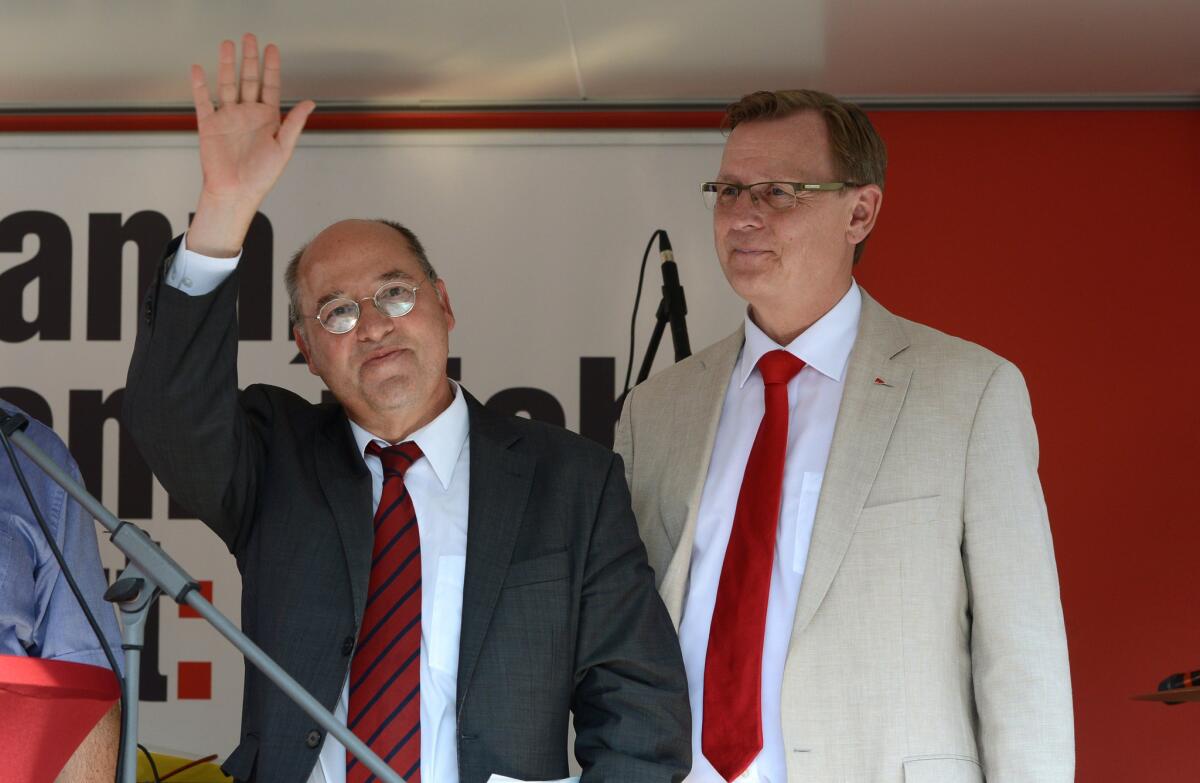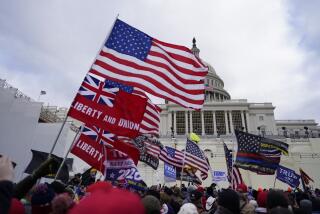Possible far-left comeback sends ripples through German politics

The verdant fields, once covered with bustling farms, are now only dotted with them. Factories pop up every few miles, but mostly as faded husks of their 20th century selves. Thuringia has the decided feel of a state lagging behind in the economic powerhouse that is modern Germany.
On the serene streets of Erfurt, the state capital, many people are worn out. They are fatigued by a quarter of a century of rule under Angela Merkel’s center-right Christian Democratic Union; by an economy that, with an unemployment rate several percentage points higher and wages lower than the national averages, never seems to live up to its promise; by their nation’s involvement for more than a decade in faraway conflicts that seem very removed from these sleepy Central European precincts.
“They’re tired of what people in the other parties are telling them,” politician Bodo Ramelow said. “They want a change.”
Ramelow, 58, aims to be the one leading the revolution. The former union leader heads the Thuringian wing of the Left Party, which espouses nationalizing banks, reining in hedge funds and dissolving NATO. Next month, the Left will become the first radical socialist party to run an eastern state since the hated Socialist Union Party, or SED, ruled East Germany during the Cold War.
The Left garnered a startling 28% of the vote during state elections in September, a close second to Merkel’s long-powerful CDU and well ahead of more moderate left-wing alternatives such as the Social Democratic Party and the Green Party. A savvy operator, Ramelow then wooed the Social Democrats and Greens to join a coalition that the Left will lead.
The specter of a far-left comeback, even in this comparatively small state, has sent ripples through the German political system. It has provoked those who bitterly recall East Germany and the Cold War and touched off sensitive questions about whether a country’s dark period should be categorically shunned or cherry-picked for worthy ideas.
As this nation of 80 million held commemorations this month for the 25th anniversary of the fall of the Berlin Wall, entertainers and politicians spoke spiritedly of a period consigned to history. But the reality is proving thornier. Far from abandoning their socialist past, a not insignificant number of Germans are returning to it.
“The CDU has run this place for a long time, and what did it get us?” said Axl Schroeder, a restaurant manager in Erfurt, about 150 miles southwest of Berlin. “It’s time for the Left to get a chance.”
Such talk is popular in a place that supporters hope will become a laboratory experiment for radical leftist politics on a national scale. With 12% of the 631 seats in the Bundestag, the Left is now Germany’s third-biggest party and, under charismatic legislative leader Gregor Gysi, the largest in the opposition. If the Left can prove effective in Thuringia, supporters say, victories could be forthcoming in other states as well as nationally.
The party has found adherents not just among dyed-in-the-wool easterners but among the country’s 4 million immigrants, old West German lefties and disenchanted voters across a variety of backgrounds and geography. These supporters say that capitalism and European Union-centric policies have not worked in Germany the way its proponents believe; many also oppose the nation’s involvement in the North Atlantic Treaty Organization and its involvement in various military actions and alliances. The Left, these members say, can provide an alternative and a counterbalance to the dominant ways of German politics.
Such ideas, however, are offensive to many who fought against the East German state. Though even opponents of the Left believe a return to the Stasi secret police that defined the era is unlikely — the party has in fact gained much political mileage in the last year criticizing U.S. surveillance methods — they say the Left’s platform is politically and psychologically dangerous.
President Joachim Gauck, a former East German dissident, has stepped out of his ceremonial role in recent weeks to rail against the Left’s surge, saying he found it “unconscionable.” Wolf Biermann, a 1970s-era singer and disaffected socialist, took the opportunity of an unassuming concert related to the Berlin Wall anniversary in the Bundestag this month to unleash a diatribe at the party.
The Left, he said, is “the miserable remnant of what’s been overcome.” He also called them “dragon spawn” and “rotting vermin.”
But supporters say such dismissals underestimate what a socialist system represents to people in the east. From their perspective, German unification has brought easterners diminished factories, eroded state-run industries such as coal mining and, perhaps more important, eradicated a sense of national identity.
“People don’t understand there’s a depression that afflicts those who lived in the east and saw their lives ruined by capitalism,” said Benjamin Immanuel-Hoff, a former state secretary for the Left in Thuringia who advises Ramelow. “There were psychologists who were going to classify it as a disease, that’s how sad it made many Germans. We can’t pretend this isn’t the case.”
Trading on this long-simmering grievance is a fine line for the Left. The party must play on nostalgia without suggesting that it wishes to return to the modest economy or sweeping government oversight of the communist era. Ramelow says his is a modern and open socialism. He is fond of saying things such as “we must not go backward, only forward,” but he also speaks of including former Stasi members in the political process, a topic verboten in many German political circles.
“There were 179,000 informants. Where did they go?” he asked. “They’re still here. And they need to be part of the transformation.”
He said opponents’ fear of a return to a Soviet-era Russian alignment is unfounded, even if the policies were those that would largely please Russian President Vladimir Putin.
“Russian soldiers once stood out there, threatening our people,” Ramelow said, looking out the window of his Erfurt office at a theater and ice-skating rink. “So I’m not pro-Putin. I’m not pro-Russian. But I think the banks and the capitalist system have failed the people, and we need to ask why. I think NATO has problems, and we need to ask why.”
On the genealogy chart of German political parties, the Left is descended from the SED: It merges the party’s successor organization with another socialist faction. Leaders say the Left contains no power brokers in key positions from the communist era. Critics say that is a distinction without a difference.
The emergence of the Left is a sign of generally more polarized politics in Europe. It coincides with the rise of the hard-line anti-euro Alternative for Germany party and the far-right National Front in France, which won 25% of the vote in European elections in May.
Whether such larger ambitions await the Left is an open question. Parliamentary leader Gysi’s Cold War past in the ranks of the East German elite is perceived as a liability. Ramelow, on the other hand, comes from the west and carries none of that baggage. He also is an outspoken Christian in a formally atheistic party — a photo of Pope Francis sits alongside those of fellow party leaders in his office — a factor that has helped the Left in a religiously conservative place such as Thuringia.
“I feel like I don’t fit in anywhere,” Ramelow said with a laugh, though he also is clearly aware that such political androgyny has been key to convincing people that the Left is more than a party for ardent Marxists.
Ramelow said he believed his party had been misunderstood, and that comments from Gauck and Biermann are less a sign of a national backlash than garden-variety factional politics.
“Do people in America,” he asked, “wonder why Texans don’t understand New York Democrats?” Making the Left more palatable to the mainstream, he believes, is simply a matter of time and persuasion.
But some German voters may be resistant anyway. A few blocks from Ramelow’s office, some shook their head at the Left’s resurgence.
“I still remember during the days of East Germany when the Stasi came to the printing shop I worked at and forced us to tell on our neighbors,” said Hanna-Laura Beute, an elderly woman. “I didn’t trust them then. Why should I trust them now?”
More to Read
Start your day right
Sign up for Essential California for news, features and recommendations from the L.A. Times and beyond in your inbox six days a week.
You may occasionally receive promotional content from the Los Angeles Times.







